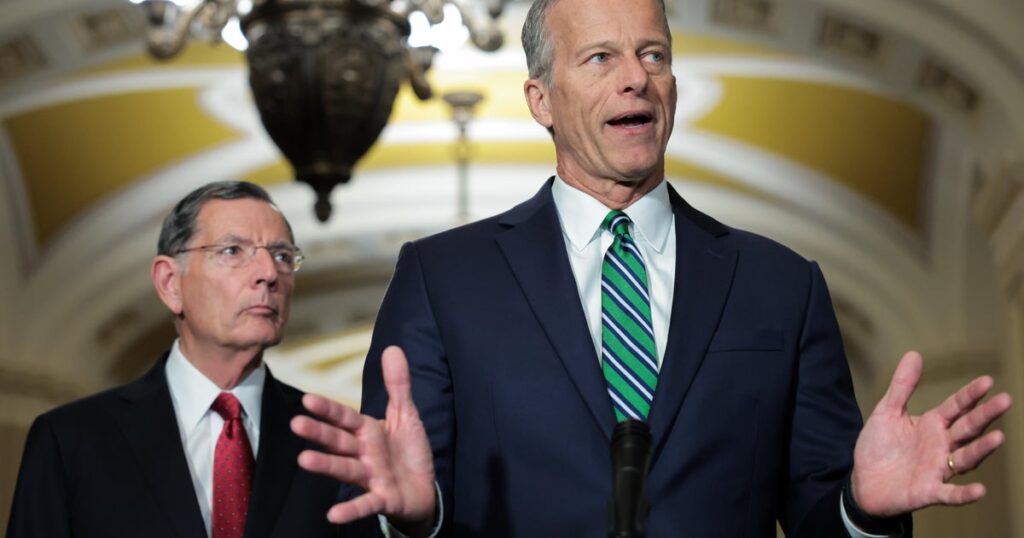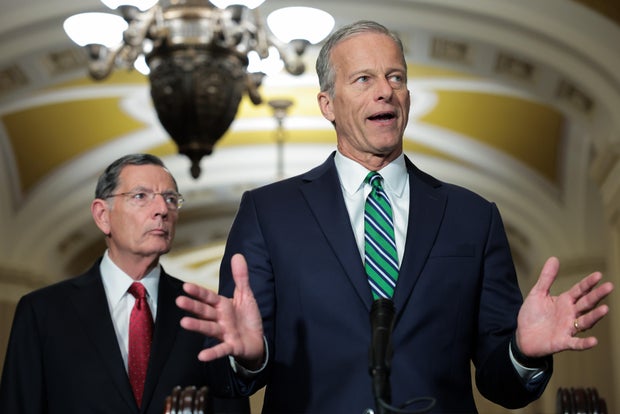Washington — Senate Democrats sank a key procedural vote Thursday on a first-of-its-kind crypto regulation bill, after days of opposition amid growing ties between the digital asset industry and the Trump family.
Known as the GENIUS Act, the legislation would create a regulatory framework for stablecoins, a type of cryptocurrency tied to the value of an asset like the U.S. dollar. The measure advanced out of the Senate Banking Committee with bipartisan support in March, but has since lost Democratic support amid concerns about President Trump and his family’s business ventures involving cryptocurrency.
In a 48 to 49 vote, the measure fell short of the 60 votes necessary to move forward. Two Republicans, Sens. Rand Paul of Kentucky and Josh Hawley of Missouri, joined with all Democrats in opposition.
The bill’s advancement out of committee came before the announcement earlier this month that an Abu Dhabi-backed firm will invest billions of dollars in a Trump family-linked crypto firm, World Liberty Financial. The deal involves the firm buying $2 billion worth of a stablecoin offered by World Liberty Financial, and using it to invest in crypto exchange Binance.
The legislation had been pursued on a bipartisan basis, with a number of iterations. But Sen. Elizabeth Warren, a Massachusetts Democrat and the ranking member on the Senate Banking Committee, told reporters that Democrats hadn’t seen a final version of the bill just hours ahead of the vote.
Warren outlined a handful of “problem” areas within the latest iteration of the bill they have seen, including provisions that she argued would “supercharge Donald Trump’s corruption” and undercut consumer protection laws.
“It runs a substantial risk of eventually blowing up the U.S. economy and putting us once more in a position where taxpayers have to bail out the billionaires while they end up paying for the risks that the rich people took on,” Warren said.
Warren acknowledged that there were some ongoing negotiations, but she said there was no agreement between Democrats and Republicans ahead of the vote. She said a version of the legislation that “puts appropriate regulations in place on stablecoins” could get a huge majority of the chamber, with significant support on both sides of the aisle.
White House spokesperson Anna Kelly told CBS News in a statement earlier this week that Mr. Trump’s “assets are in a trust managed by his children, and there are no conflicts of interest.”
“Stablecoin legislation should be passed on a bipartisan basis. President Trump is dedicated to making America the crypto capital of the world and revolutionizing our digital financial technology,” she said.
Meanwhile, Senate Majority Leader John Thune urged Senate Democrats to vote in favor of moving forward with the legislation earlier Thursday, stressing on the Senate floor that this is the sixth version of the legislation, drafted with inputs from both Republicans and Democrats. He said if senators want to further modify the bill, they should vote to move forward with the legislation.
Kayla Bartkowski/Getty Images
“Once we’re on the bill, we can discuss changes here on the floor,” Thune said. “We’ve had an open process here on this bill so far, so why stop now.”
The South Dakota Republican lauded the GENIUS Act, saying it provides “clarity” for innovators amid efforts to make the U.S. a leader on financial innovations and stablecoins, calling it the “first step” in bringing digital assets into the U.S. financial system “by setting a clear framework for stablecoins.” He noted it’s “by no means the last word on digital assets,” adding that he “expects the Senate to continue to work in this space.”
The majority leader told reporters ahead of the vote that whether the legislation advances is “up to the Democrats,” saying, “we’ve done everything we can to accommodate their concerns.”
“We’re trying to see if there’s a path forward that would enable us to get any changes that they would like,” Thune said. “But at some point, they’re going to have to take yes for an answer.”
Ahead of the vote Thursday, Senate Democrats had aimed to push it back, seeking more time review the legislation. Sen. Ruben Gallego, an Arizona Democrat, requested unanimous consent to move the vote to Monday, combining it with another vote at that time. But the request was voted down.




